Unit 5 Lesson 2 A friendly neighbourhood课件 (共37张PPT,含内嵌视频)冀教版(2024)七年级下册
文档属性
| 名称 | Unit 5 Lesson 2 A friendly neighbourhood课件 (共37张PPT,含内嵌视频)冀教版(2024)七年级下册 |
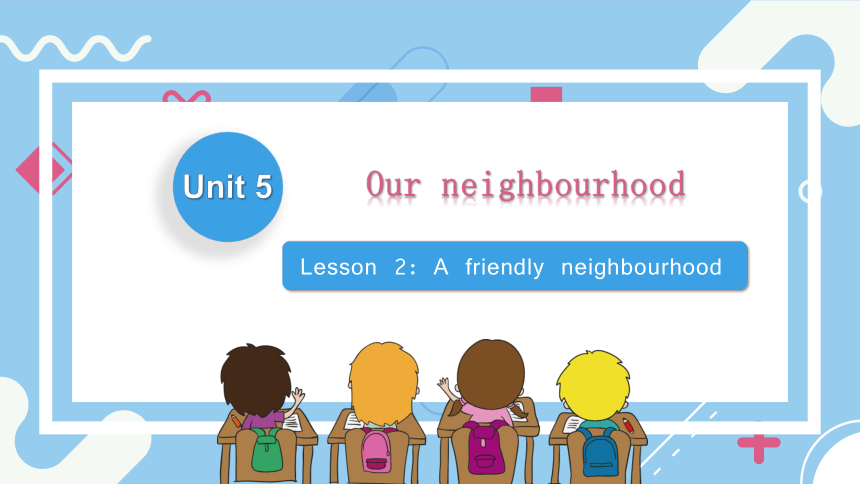
|
|
| 格式 | pptx | ||
| 文件大小 | 16.1MB | ||
| 资源类型 | 教案 | ||
| 版本资源 | 冀教版 | ||
| 科目 | 英语 | ||
| 更新时间 | 2025-04-21 00:00:00 | ||
图片预览

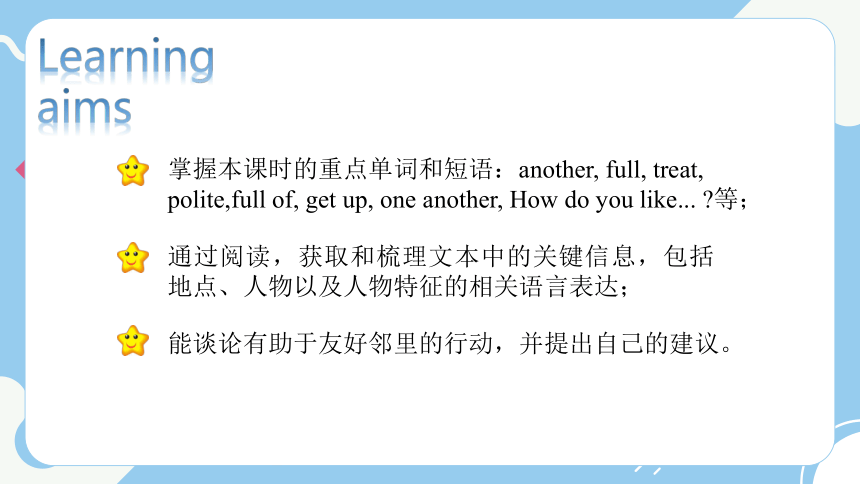
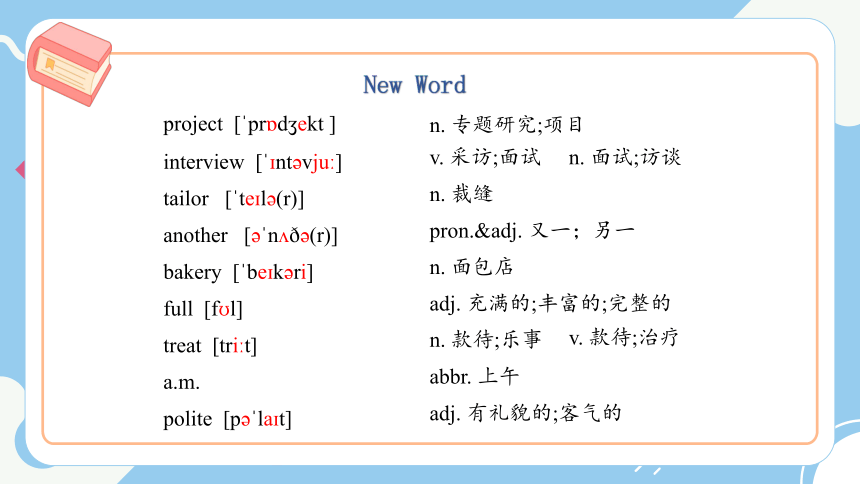


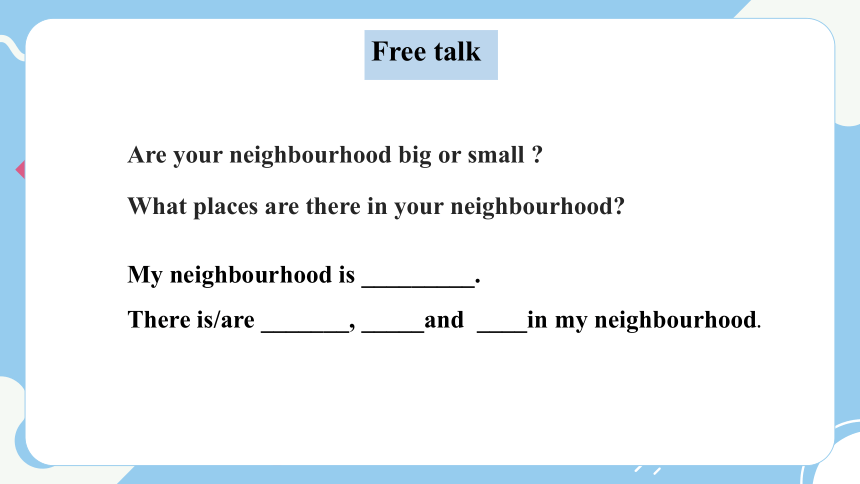
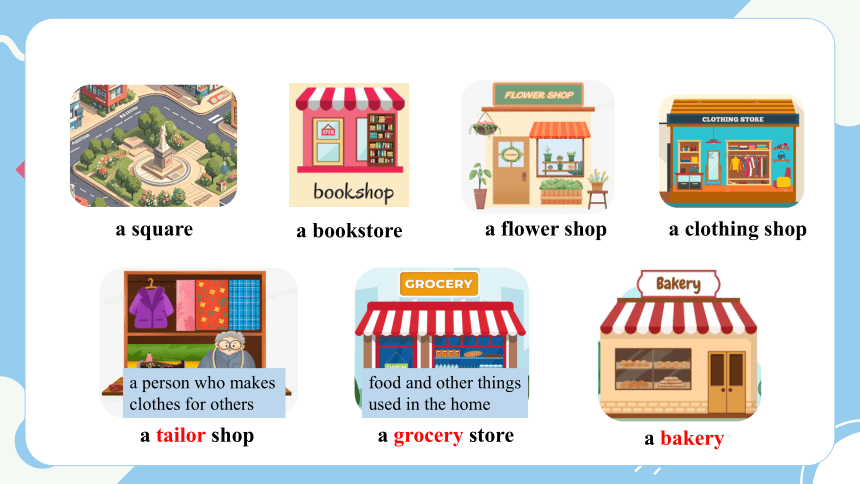

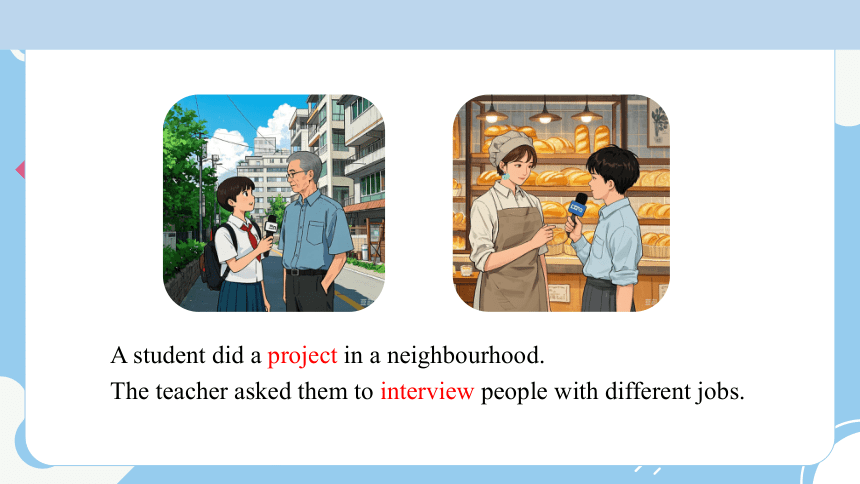
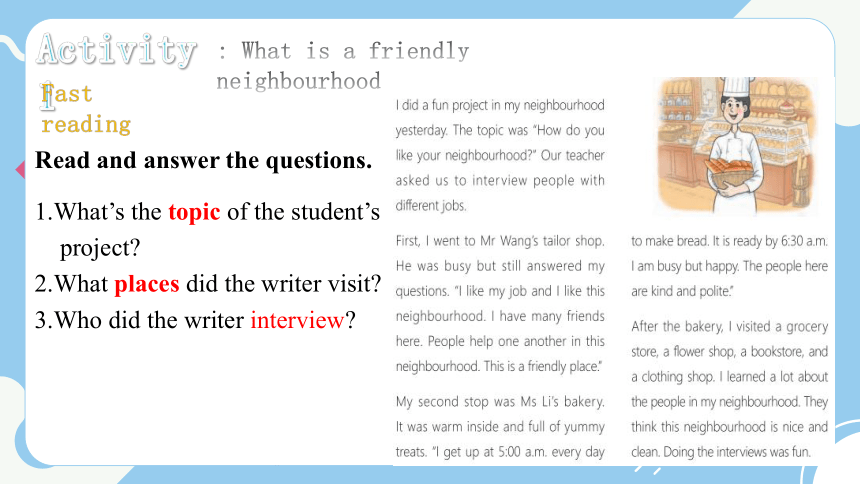
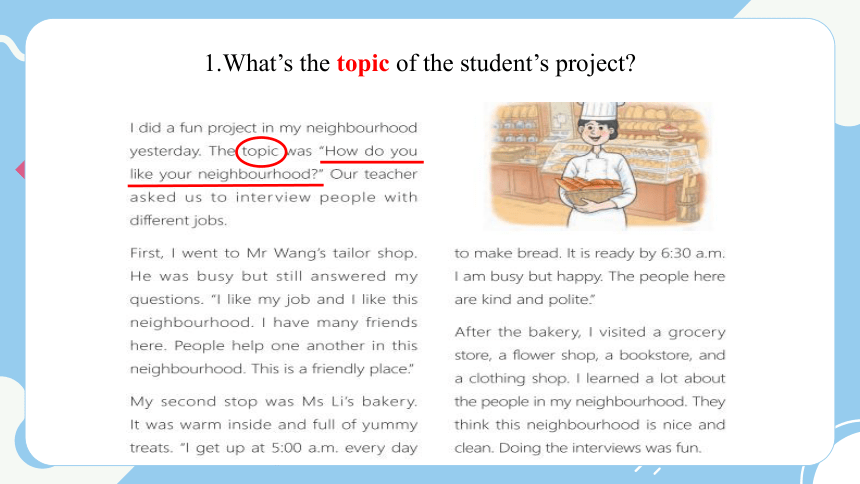

文档简介
(共37张PPT)
Our neighbourhood
Lesson 2: A friendly neighbourhood
Unit 5
Learning aims
通过阅读,获取和梳理文本中的关键信息,包括地点、人物以及人物特征的相关语言表达;
掌握本课时的重点单词和短语:another, full, treat, polite,full of, get up, one another, How do you like... 等;
能谈论有助于友好邻里的行动,并提出自己的建议。
New Word
project [ pr d ekt ]
n. 专题研究;项目
interview [ nt vju ]
v. 采访;面试
n. 面试;访谈
tailor [ te l (r)]
n. 裁缝
another [ n (r)]
pron.&adj. 又一;另一
bakery [ be k ri]
n. 面包店
full [f l]
adj. 充满的;丰富的;完整的
treat [tri t]
n. 款待;乐事
v. 款待;治疗
a.m.
abbr. 上午
polite [p la t]
adj. 有礼貌的;客气的
grocery [ ɡr s ri]
n. 食品杂货店
store [st (r)]
n. 商店;仓库;贮存物
v. 贮存;保存
clothing [ kl ]
n. 衣服;服装
treat [tri t]
n. 款待;乐事
v. 款待;治疗
a.m.
abbr. 上午
polite [p la t]
adj. 有礼貌的;客气的
Lead-in
What’s the video about
Are your neighbourhood big or small
What places are there in your neighbourhood
My neighbourhood is _________.
There is/are _______, _____and ____in my neighbourhood.
Free talk
a square
a bookstore
a flower shop
a clothing shop
a tailor shop
a person who makes clothes for others
a grocery store
food and other things used in the home
a bakery
What do your neighbours do
01
What do you think of them
02
My neighbour is a/an______.
He/she works in/at ....
I think she/he is .....
worker farmer teacher doctor singer player
cook nurse firefighter
student policeman postman waiter driver ...
handsome, cute, beautiful,
easy-going, active, kind, nice, friendly, lovely...
What do you know about the people in your neighbourhood
A student did a project in a neighbourhood.
The teacher asked them to interview people with different jobs.
Activity 1
: What is a friendly neighbourhood
1.What’s the topic of the student’s
project
2.What places did the writer visit
3.Who did the writer interview
Read and answer the questions.
Fast reading
1.What’s the topic of the student’s project
frist
third
fifth
second
fourth
sixth
a tailor’s shop
a bakery
a grocery store
a flower shop
a bookstore
a clothing shop
2.What places did the writer visit
3.Who did the writer interview
3.Why did Mr Wang still answer the writer’s questions though (虽然) he was busy
2.Why did Mr Wang think the neighbourhood is a friendly place
1.What did Mr.Wang think of his neighbourhood
Read para.2 and answer the questions.
Careful reading
①
②
He was kind and friendly.
He liked the neighbourhood very much.
He wanted to help the writer to learn more about the neighbourhood.
4.What do you think of Ms Li
1.How did the writer describe the bakery
3.What did Ms.Li think of the people in the neighbourhood
2.What did Ms Li do every day
Read para.3 and answer the questions.
①
②
③
hardworking
postitive and optimistic
kind
polite
Read para.4 and answer the questions.
What did the writer learn after the interview
They all love their neighbourhood!
A Do you think Mr Wang likes this neighbourhood Why
B What kind of person is Ms Li
C What can you learn from the information above
Read the passage again and then answer the questions.
Yes. Because he says he has many friends here. He thinks this neighbourhood is a friendly place.
She is kind, polite and hard-working.
3
We can learn the people here are friendly and how to be good neighbours.
Do you like to live in this neighbourhood Why
friendly neighbourhood
What do you think makes a neighbourhood friendly
They say "Happy Chinese New Year" to their neighbours during the Spring Festival.
They say hello to their neighbours.
They sing, dance, and make loud noises when neighbours are at home.
They take care of the plants in the neighbourhood.
They help neighbours when they are in need.
They hold the door for the elderly.
They walk the pet dogs without a leash.
√
√
√
√
√
Activity 2
: Ways to make a neighbourhood
俗话说“远亲不如近邻”。近日某学校正在进行题为“My friendly neighbourhood”的征文活动,假如你是这所学校的学生李华,请根据以下提示写一篇征文稿。
提示:
1.What places are there in your neighbourhood
2.What do your neighbours do
3.How do they help others (give an example)
4.What’s your advice for making your neighbourhood more friendly
5.How do you feel to live in your neighbourhood
要求:1.必须包含提示中的所有内容,可适当发挥。
2.80词左右。标题和开头已给出
My friendly neighbourhood
I’m Li Hua. I live in a friendly neighbourhood. _______________________________
________________________________________________________________________
________________________________________________________________________
Language point 1
1. How do you like your neighbourhood
How do you like... 你(们)觉得……怎么样
常用于询问对方的观点或看法。其同义表达有:
What do you think of...
How do you feel about...
e.g. —How do you like the science fair 你觉得这个科学展怎么样?
—Wonderful!非常棒!
2. Our teacher asked us to interview people with different jobs.
interview / nt vju / v.采访;面试 n.面试;访谈
(1)[动词]采访;面试
interview sb. for sth. 为某事采访/面试某人
interview sb. about sth.就某事采访某人;就某事与某人面谈
e.g. These days we are interviewing some students for the coming art festival.
这些天我们在为即将到来的艺术节采访一些学生。
We interviewed Mike about his own cooking.
我们就迈克的厨艺采访了他。
Language point 2
“interview sb.” 表示 “采访某人”;“be interviewed by sb.” 表示 “被某人采访”。
e.g. The reporter interviewed the famous singer.
记者采访了这位著名歌手。
I was interviewed by a manager for a job.
我接受了一位经理的工作面试。
(2)[名词]面试;访谈
e.g. What time will Mike have the interview tomorrow morning
迈克明天早上几点面试?
After this athlete won his gold medal, his father received an interview.
在这名运动员获得金牌后,他的父亲接受了采访。
interview采访
interview面试
interviewee interviewer interviewee
被采访者 采访者 参加面试者
interviewer
主持面试者
【拓】
interviewer n.采访者;主持面试者
interviewee n.被采访者;参加面试者
“ tailor shop” 的中文释义为 “裁缝店”,通常作为一个地点名词出现在句子中。
e.g. My mother took my clothes to the tailor shop to be altered.
我妈妈把我的衣服拿到裁缝店去改。
There is a nice tailor shop near my home.
我家附近有一家不错的裁缝店。
He works in a tailor shop and makes beautiful suits.
他在一家裁缝店工作,制作漂亮的西装。
3. I went to Mr Wang’s tailor shop.
Language point 3
“help one another” 的中文释义为 “互相帮助”,在句子中可作谓语或宾语补足语等。
e.g. In our class, we always help one another.
在我们班上,我们总是互相帮助。
They promised to help one another in times of trouble.
他们承诺在困难时期互相帮助。
The students should learn to help one another to improve their studies.
学生们应该学会互相帮助以提高学习成绩。
4. People help one another in this neighbourhood.
Language point 4
5. It was warm inside and full of yummy treats.
full /f l/ adj.充满的;丰富的;完整的
(1)充满的,满的
反义词是empty“空的”。
full of 充满
e.g. Life is full of unexpected surprises.
生活充满了意想不到的惊喜。
Language point 5
(2)丰富的,许多的
e.g. The garden full of flowers is very beautiful.
这个花园百花齐放,非常美丽。
(3)完整的
通常用于名词前。
e.g. Please fill in your full name and address.
请填写你的全名和地址。
I would like a full English breakfast.
我想要全份英式早餐。
【拓】(1)[形容词]忙的
相当于busy, 反义词是free“空闲的”。
e.g. Next week is full for me. I have lots of meetings to attend.
我下周很忙,有很多会议要参加。
(2)[形容词]吃饱了的
反义词是hungry“感到饿的;饥饿的”。
e.g. Thank you for your delicious cake, but I am really full.
谢谢你美味的蛋糕,但是我真的吃饱了。
6. I get up at 5:00 a.m. every day to make bread.
get up 起床, 其对应词组为go to bed“上床睡觉”。
e.g. I usually go to bed at 9:30 p.m. and get up at 6:30 a.m.
我通常晚上9:30上床睡觉,早上6:30起床。
get to 到达 get off 下车 get here/there 到这儿/那儿
get out 出来 get on 上车 get home 到家
get back 回去 get in 进入
【拓】与get有关的其他常见短语:
Language point 6
a.m. / e em/ abbr. 上午 p.m. abbr. 下午
(1)a.m./p.m.也可用am/pm或A.M./P.M.表示。
西方国家按十二小时制,通常以正午12点为界,午前12小时用a.m.表示,午后12小时用p.m.表示。
(2)其用法为“时刻(数字)+a.m./p.m.”,相当于“时刻(数字)+in the morning/afternoon/evening”。
e.g. 10 a.m.=10 in the morning 上午10点
5 p.m.=5 in the afternoon 下午5点
7. The people here are kind and polite.
polite /p la t/ adj. 有礼貌的;客气的
be polite to sb. 对某人有礼貌
e.g. Jack is a polite boy. He’s always polite to others.
杰克是一个有礼貌的男孩。他对别人总是很有礼貌。
【拓】
Language point 7
Summary
Key words
project, interview, another, full, treat, polite
Structures and expressions
full of, get up, one another
How do you like...
Exercise
一、完成句子。
1. 这家餐馆周末总是挤满了人。
This restaurant is always _____ ____ people ____ _________.
2. 朋友应该互相信任。
Friends should trust _____ ________.
3. 我一般早上八点起床。
I usually _____ _____ at 8:00 a.m.
full of
one another
get up
on weekends
Homework
1. Think about and write some neighbours in your neighbourhood.
Our neighbourhood
Lesson 2: A friendly neighbourhood
Unit 5
Learning aims
通过阅读,获取和梳理文本中的关键信息,包括地点、人物以及人物特征的相关语言表达;
掌握本课时的重点单词和短语:another, full, treat, polite,full of, get up, one another, How do you like... 等;
能谈论有助于友好邻里的行动,并提出自己的建议。
New Word
project [ pr d ekt ]
n. 专题研究;项目
interview [ nt vju ]
v. 采访;面试
n. 面试;访谈
tailor [ te l (r)]
n. 裁缝
another [ n (r)]
pron.&adj. 又一;另一
bakery [ be k ri]
n. 面包店
full [f l]
adj. 充满的;丰富的;完整的
treat [tri t]
n. 款待;乐事
v. 款待;治疗
a.m.
abbr. 上午
polite [p la t]
adj. 有礼貌的;客气的
grocery [ ɡr s ri]
n. 食品杂货店
store [st (r)]
n. 商店;仓库;贮存物
v. 贮存;保存
clothing [ kl ]
n. 衣服;服装
treat [tri t]
n. 款待;乐事
v. 款待;治疗
a.m.
abbr. 上午
polite [p la t]
adj. 有礼貌的;客气的
Lead-in
What’s the video about
Are your neighbourhood big or small
What places are there in your neighbourhood
My neighbourhood is _________.
There is/are _______, _____and ____in my neighbourhood.
Free talk
a square
a bookstore
a flower shop
a clothing shop
a tailor shop
a person who makes clothes for others
a grocery store
food and other things used in the home
a bakery
What do your neighbours do
01
What do you think of them
02
My neighbour is a/an______.
He/she works in/at ....
I think she/he is .....
worker farmer teacher doctor singer player
cook nurse firefighter
student policeman postman waiter driver ...
handsome, cute, beautiful,
easy-going, active, kind, nice, friendly, lovely...
What do you know about the people in your neighbourhood
A student did a project in a neighbourhood.
The teacher asked them to interview people with different jobs.
Activity 1
: What is a friendly neighbourhood
1.What’s the topic of the student’s
project
2.What places did the writer visit
3.Who did the writer interview
Read and answer the questions.
Fast reading
1.What’s the topic of the student’s project
frist
third
fifth
second
fourth
sixth
a tailor’s shop
a bakery
a grocery store
a flower shop
a bookstore
a clothing shop
2.What places did the writer visit
3.Who did the writer interview
3.Why did Mr Wang still answer the writer’s questions though (虽然) he was busy
2.Why did Mr Wang think the neighbourhood is a friendly place
1.What did Mr.Wang think of his neighbourhood
Read para.2 and answer the questions.
Careful reading
①
②
He was kind and friendly.
He liked the neighbourhood very much.
He wanted to help the writer to learn more about the neighbourhood.
4.What do you think of Ms Li
1.How did the writer describe the bakery
3.What did Ms.Li think of the people in the neighbourhood
2.What did Ms Li do every day
Read para.3 and answer the questions.
①
②
③
hardworking
postitive and optimistic
kind
polite
Read para.4 and answer the questions.
What did the writer learn after the interview
They all love their neighbourhood!
A Do you think Mr Wang likes this neighbourhood Why
B What kind of person is Ms Li
C What can you learn from the information above
Read the passage again and then answer the questions.
Yes. Because he says he has many friends here. He thinks this neighbourhood is a friendly place.
She is kind, polite and hard-working.
3
We can learn the people here are friendly and how to be good neighbours.
Do you like to live in this neighbourhood Why
friendly neighbourhood
What do you think makes a neighbourhood friendly
They say "Happy Chinese New Year" to their neighbours during the Spring Festival.
They say hello to their neighbours.
They sing, dance, and make loud noises when neighbours are at home.
They take care of the plants in the neighbourhood.
They help neighbours when they are in need.
They hold the door for the elderly.
They walk the pet dogs without a leash.
√
√
√
√
√
Activity 2
: Ways to make a neighbourhood
俗话说“远亲不如近邻”。近日某学校正在进行题为“My friendly neighbourhood”的征文活动,假如你是这所学校的学生李华,请根据以下提示写一篇征文稿。
提示:
1.What places are there in your neighbourhood
2.What do your neighbours do
3.How do they help others (give an example)
4.What’s your advice for making your neighbourhood more friendly
5.How do you feel to live in your neighbourhood
要求:1.必须包含提示中的所有内容,可适当发挥。
2.80词左右。标题和开头已给出
My friendly neighbourhood
I’m Li Hua. I live in a friendly neighbourhood. _______________________________
________________________________________________________________________
________________________________________________________________________
Language point 1
1. How do you like your neighbourhood
How do you like... 你(们)觉得……怎么样
常用于询问对方的观点或看法。其同义表达有:
What do you think of...
How do you feel about...
e.g. —How do you like the science fair 你觉得这个科学展怎么样?
—Wonderful!非常棒!
2. Our teacher asked us to interview people with different jobs.
interview / nt vju / v.采访;面试 n.面试;访谈
(1)[动词]采访;面试
interview sb. for sth. 为某事采访/面试某人
interview sb. about sth.就某事采访某人;就某事与某人面谈
e.g. These days we are interviewing some students for the coming art festival.
这些天我们在为即将到来的艺术节采访一些学生。
We interviewed Mike about his own cooking.
我们就迈克的厨艺采访了他。
Language point 2
“interview sb.” 表示 “采访某人”;“be interviewed by sb.” 表示 “被某人采访”。
e.g. The reporter interviewed the famous singer.
记者采访了这位著名歌手。
I was interviewed by a manager for a job.
我接受了一位经理的工作面试。
(2)[名词]面试;访谈
e.g. What time will Mike have the interview tomorrow morning
迈克明天早上几点面试?
After this athlete won his gold medal, his father received an interview.
在这名运动员获得金牌后,他的父亲接受了采访。
interview采访
interview面试
interviewee interviewer interviewee
被采访者 采访者 参加面试者
interviewer
主持面试者
【拓】
interviewer n.采访者;主持面试者
interviewee n.被采访者;参加面试者
“ tailor shop” 的中文释义为 “裁缝店”,通常作为一个地点名词出现在句子中。
e.g. My mother took my clothes to the tailor shop to be altered.
我妈妈把我的衣服拿到裁缝店去改。
There is a nice tailor shop near my home.
我家附近有一家不错的裁缝店。
He works in a tailor shop and makes beautiful suits.
他在一家裁缝店工作,制作漂亮的西装。
3. I went to Mr Wang’s tailor shop.
Language point 3
“help one another” 的中文释义为 “互相帮助”,在句子中可作谓语或宾语补足语等。
e.g. In our class, we always help one another.
在我们班上,我们总是互相帮助。
They promised to help one another in times of trouble.
他们承诺在困难时期互相帮助。
The students should learn to help one another to improve their studies.
学生们应该学会互相帮助以提高学习成绩。
4. People help one another in this neighbourhood.
Language point 4
5. It was warm inside and full of yummy treats.
full /f l/ adj.充满的;丰富的;完整的
(1)充满的,满的
反义词是empty“空的”。
full of 充满
e.g. Life is full of unexpected surprises.
生活充满了意想不到的惊喜。
Language point 5
(2)丰富的,许多的
e.g. The garden full of flowers is very beautiful.
这个花园百花齐放,非常美丽。
(3)完整的
通常用于名词前。
e.g. Please fill in your full name and address.
请填写你的全名和地址。
I would like a full English breakfast.
我想要全份英式早餐。
【拓】(1)[形容词]忙的
相当于busy, 反义词是free“空闲的”。
e.g. Next week is full for me. I have lots of meetings to attend.
我下周很忙,有很多会议要参加。
(2)[形容词]吃饱了的
反义词是hungry“感到饿的;饥饿的”。
e.g. Thank you for your delicious cake, but I am really full.
谢谢你美味的蛋糕,但是我真的吃饱了。
6. I get up at 5:00 a.m. every day to make bread.
get up 起床, 其对应词组为go to bed“上床睡觉”。
e.g. I usually go to bed at 9:30 p.m. and get up at 6:30 a.m.
我通常晚上9:30上床睡觉,早上6:30起床。
get to 到达 get off 下车 get here/there 到这儿/那儿
get out 出来 get on 上车 get home 到家
get back 回去 get in 进入
【拓】与get有关的其他常见短语:
Language point 6
a.m. / e em/ abbr. 上午 p.m. abbr. 下午
(1)a.m./p.m.也可用am/pm或A.M./P.M.表示。
西方国家按十二小时制,通常以正午12点为界,午前12小时用a.m.表示,午后12小时用p.m.表示。
(2)其用法为“时刻(数字)+a.m./p.m.”,相当于“时刻(数字)+in the morning/afternoon/evening”。
e.g. 10 a.m.=10 in the morning 上午10点
5 p.m.=5 in the afternoon 下午5点
7. The people here are kind and polite.
polite /p la t/ adj. 有礼貌的;客气的
be polite to sb. 对某人有礼貌
e.g. Jack is a polite boy. He’s always polite to others.
杰克是一个有礼貌的男孩。他对别人总是很有礼貌。
【拓】
Language point 7
Summary
Key words
project, interview, another, full, treat, polite
Structures and expressions
full of, get up, one another
How do you like...
Exercise
一、完成句子。
1. 这家餐馆周末总是挤满了人。
This restaurant is always _____ ____ people ____ _________.
2. 朋友应该互相信任。
Friends should trust _____ ________.
3. 我一般早上八点起床。
I usually _____ _____ at 8:00 a.m.
full of
one another
get up
on weekends
Homework
1. Think about and write some neighbours in your neighbourhood.
同课章节目录
